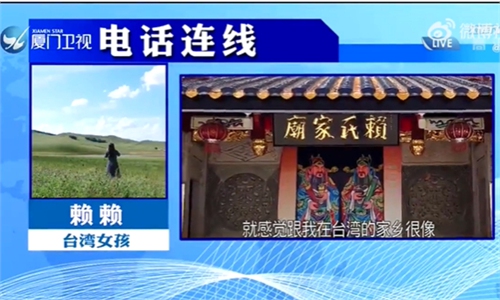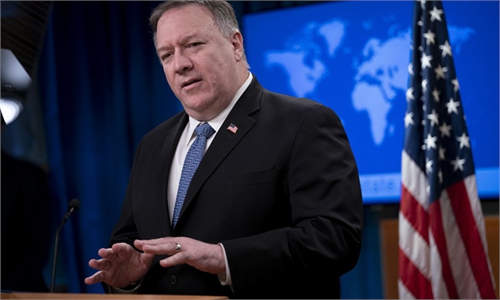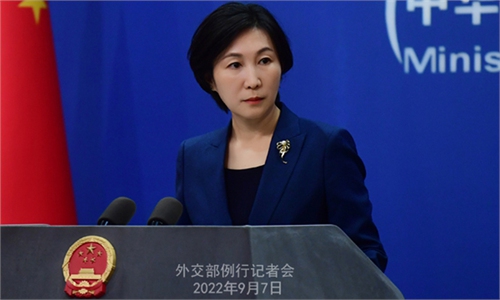Delegate to 20th CPC National Congress witnesses Party’s unremitting efforts to promote cross-Straits relations
Editor's Note:
Who is the Communist Party of China (CPC)? What is the CPC's role in the new era?
The CPC has grown into one of the largest parties in the world in the process of leading the Chinese people in seeking liberation and happiness, making China as strong and prosperous as it is today.
As the CPC ushers the nation into a new era of development, the last decade has witnessed great achievements in national strength and prosperity, with people's confidence and recognition of this path rising to unprecedentedly high levels.
With more than 96 million members, the CPC will convene its 20th National Congress in October, which is expected to guide the country's development and policymaking. Ahead of the meeting, the Global Times is publishing a series of stories to help the world understand the CPC in the new era, through the stories of CPC members working on the frontlines of various fields, as well as through observations made by respected scholars.
This installment tells the story of a delegate to the 20th CPC National Congress who is affiliated with the island of Taiwan and works on the frontline of serving Taiwan compatriots in East China's Fujian Province, sharing her observations on the CPC's unremitting efforts to promoting cross-Straits relations and integrated development.
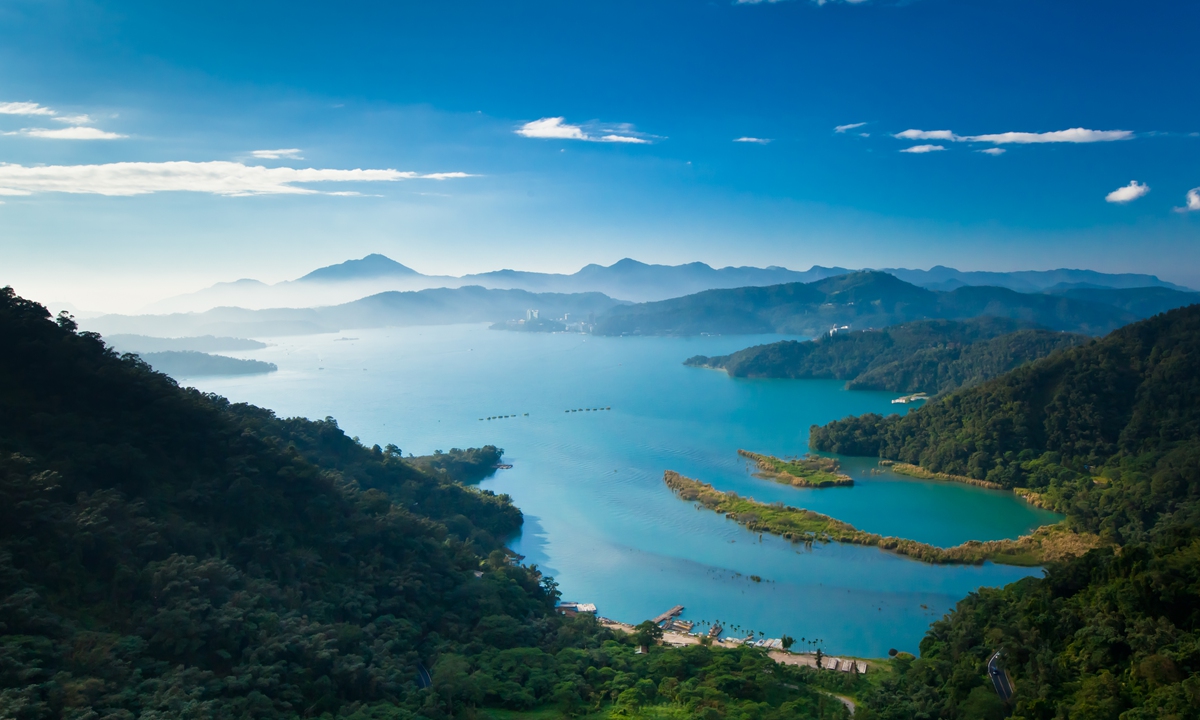
With less than a week before the national congress, Jiang Erxiong, a Party delegate who is affiliated with the island of Taiwan, and president of the Fujian Provincial Federation of Taiwan Compatriots, is already fully prepared to attend the meeting.
"Looking back at the last decade, the CPC has progressively ensured that compatriots from the island of Taiwan have equal access to public services so as to facilitate their studying, starting of businesses, working and living on the mainland, and an ongoing effort to pave the way for the island of Taiwan to benefit from the mainland's development. Over the years, the CPC has done what it said and has never broken its promises," Jiang told the Global Times.
Goodwill of mainland
Jiang was born in Minqing county of Fujian Province in 1967. Her father, a native of Changhua county in the island of Taiwan, came to the mainland in 1949, but never returned to the island of Taiwan .
Jiang joined the CPC In 1996. In 2008, she started her career at a local state-owned enterprises and joined the Fujian Provincial Committee of Taiwan Democratic Self-Government League to do Party and mass organization work.
"My family is a microcosm of cross-Straits relations," Jiang said, noting that her father lived in a time of confrontation and estrangement between the two sides, and having lived through this period, she is a staunch advocate and defender of the peaceful development of cross-Straits relations.
Over the years, Jiang has devoted herself to actively promoting communication and exchanges between the two sides of Straits. She is also very relieved that she has witnessed the arrival of a new era for compatriots from the island of Taiwan.
In recent years, the Chinese mainland has continuously unveiled a slew of policies to further promote economic and cultural exchanges and cooperation across the Taiwan Straits.
"These policies and measures are unprecedented in their intensity, coverage, and value, which demonstrate the CPC's utmost sincerity and efforts to improve and protect the well-being of compatriots from the island of Taiwan," Jiang said.
Jiang pointed out that the CPC actively responds to the expectations of youth from Taiwan, creating conditions and providing opportunities for them to come to the mainland for development, including improving the relevant provisions for students from Taiwan studying on the mainland, introducing the residence permits for people from Taiwan to simplify the approval processes for living on the mainland, and offering support in terms of start-up capital and office space for people from Taiwan to start their businesses.
The need for peace, development, and a better life is the common voice of compatriots from Taiwan, Jiang noted. "Even if the Democratic Progressive Party has kept distorting the goodwill and sincerity of the mainland, the eyes of people from Taiwan are discerning, and they respond to these tangible and convenient measures introduced by the mainland by choosing to go to the mainland, relying on the strong backing of the motherland to attain better development," she said.
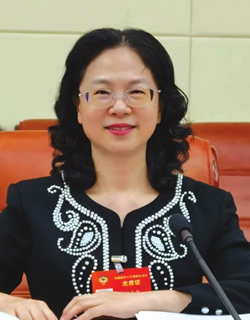
Voices from Taiwan compatriots
Jiang has learned a lot about Taiwan compatriots' life, work, and development in the mainland from her work.
During the two sessions in March, Jiang shared some stories of youth from Taiwan who live on the mainland when answering media questions, which struck a chord with people on both sides.
Chen Wencheng, for example, is a youth from Taiwan who volunteered at the Beijing 2022 Winter Olympics. He relocated to Beijing to study for a master's degree in 2011 and is now a physical education teacher at Peking University. Chen was in college during the Beijing 2008 Olympic Games in the island of Taiwan, at which time, he dreamt of participating in major sporting events in mainland.
"He told me that it was hard to see snow on the island of Taiwan, but while 300 million Chinese people engage in winter sports, capatriots in Taiwan are not absent," Jiang said.
Jiang also heard from other people from Taiwan who had worked in the mainland for many years that, "You can't see the world in the region of Taiwan, but you can let the world see you on the Chinese mainland."
In 1980, the Chinese mainland's GDP was 7.2 times that of Taiwan. By 2021, the mainland's GDP was 22.1 times that of Taiwan.
"In the 1960s and 1970s, it was a trend for youth from Taiwan to get into the National Taiwan University and then go to the US after graduation. Now it has become a trend to study at Peking University and come to the mainland for development," Jiang said, noting that today's mainland, with a long-term economic upturn and strong development resilience, has the ability and willingness to create more opportunities and favorable conditions for people from Taiwan.
At the same time, Jiang pointed out that currently, after coming to the mainland, there are more youth from Taiwan who have moved from cities to villages, from office buildings to communities, from studying and working to participating in the social governance, bringing their wisdom and strength into the trend of cross-Straits integration.
Blood ties
In 2009, Jiang returned to Changhua for the first time, to pay homage to her ancestors. She found her grandmother's tombstone facing the Chinese mainland and engraved the name of her grandfather's hometown-Jinjiang, Fujian Province.
"At that moment, I felt deeply that people on both sides of the Straits have a common custom of remembering the homeland and honoring our ancestor. This sentiment should not be evaded or hidden," Jiang said.
In her work, Jiang also witnessed youth from Taiwan, who, with the help of netizens and relatives, successfully identified their family and paying homage to their ancestors on the mainland. "This is how the inseverable blood tie on both sides passed on from generation to generation," Jiang said.
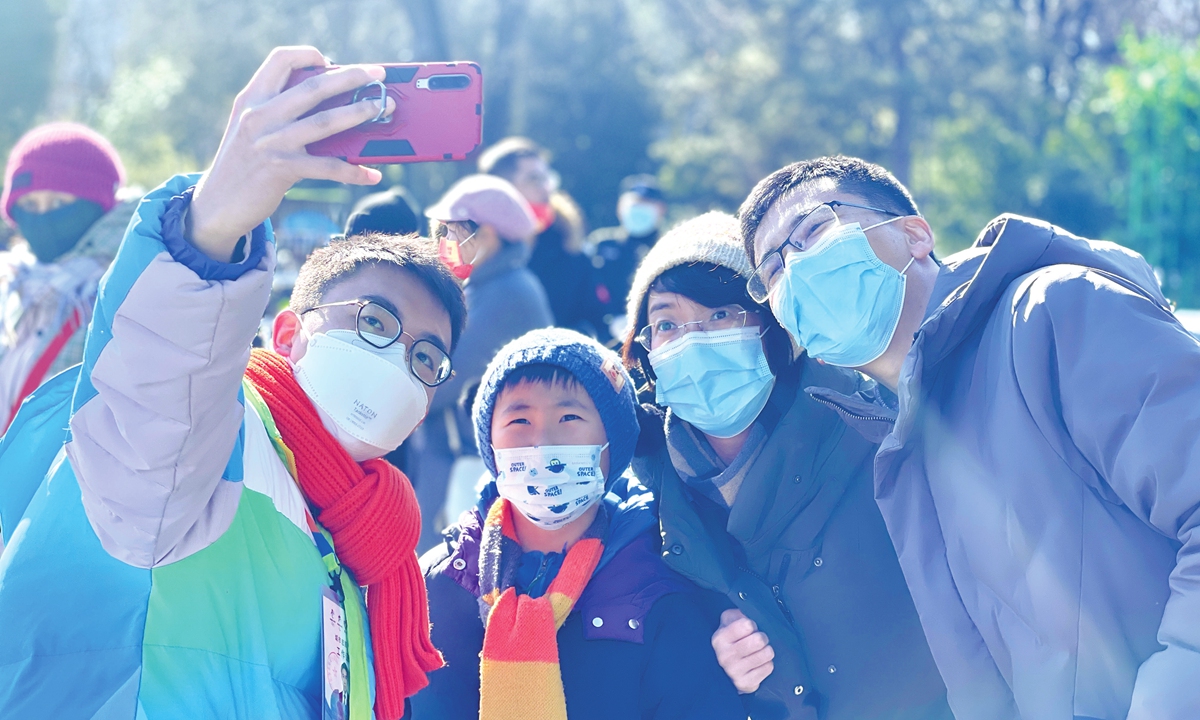
"This is how the inseverable blood tie on both sides passed on from generation to generation," Jiang said.
Jiang said that the vast number of copatriots from Taiwan in search of their ancestors on the Chinese mainland shows the fact that people between the two sides have the same roots and cultural identity, which is inherent in their genes and can stands all kinds of tests.
In order to protect the common historical memory and cultural origin of people on both sides, during the two sessions this year, Jiang made a proposal to preserve and protect Taiwan-related documents such as letters, contracts, and old photos from both sides of the Straits, which attracted wide attention.
Since this year, Fujian Province has made every effort to promote the collection and protection of "family letters across the Taiwan Straits," openly collecting the relevant archives from the society and calling for joint protection.
During the collection process, Jiang was very touched by the deep enthusiasm and great support from people from both sides of Straits. Some of them donated their valuable archives, some volunteered to advertise for the project, and some actively offered good advice for the collection work.
Jiang remarked that some Taiwan compatriots told her, the Party and the government's care has further extended and enhanced their sense of belonging and identity to the Chinese mainland.
"The kinship between people on both sides of the Straits is thicker than water, and their desire for exchanges is unstoppable. This era has witnessed China's rise, and it is also the time for cross-Taiwan Straits young people to move forward together jointly to make a difference," Jiang said.
As the 20th CPC National Congress approaches, Jiang is looking forward to the future development of cross-Straits exchanges, and she will continue to be committed to promoting the people from both sides of the Straits forging ahead side by side to share the glory of great rejuvenation of the Chinese nation.
Who is the Communist Party of China (CPC)? What is the CPC's role in the new era?
The CPC has grown into one of the largest parties in the world in the process of leading the Chinese people in seeking liberation and happiness, making China as strong and prosperous as it is today.
As the CPC ushers the nation into a new era of development, the last decade has witnessed great achievements in national strength and prosperity, with people's confidence and recognition of this path rising to unprecedentedly high levels.
With more than 96 million members, the CPC will convene its 20th National Congress in October, which is expected to guide the country's development and policymaking. Ahead of the meeting, the Global Times is publishing a series of stories to help the world understand the CPC in the new era, through the stories of CPC members working on the frontlines of various fields, as well as through observations made by respected scholars.
This installment tells the story of a delegate to the 20th CPC National Congress who is affiliated with the island of Taiwan and works on the frontline of serving Taiwan compatriots in East China's Fujian Province, sharing her observations on the CPC's unremitting efforts to promoting cross-Straits relations and integrated development.

Riyuetan, or the Sun Moon Lake, in the island of Taiwan?Photo: VCG
With less than a week before the national congress, Jiang Erxiong, a Party delegate who is affiliated with the island of Taiwan, and president of the Fujian Provincial Federation of Taiwan Compatriots, is already fully prepared to attend the meeting.
"Looking back at the last decade, the CPC has progressively ensured that compatriots from the island of Taiwan have equal access to public services so as to facilitate their studying, starting of businesses, working and living on the mainland, and an ongoing effort to pave the way for the island of Taiwan to benefit from the mainland's development. Over the years, the CPC has done what it said and has never broken its promises," Jiang told the Global Times.
Goodwill of mainland
Jiang was born in Minqing county of Fujian Province in 1967. Her father, a native of Changhua county in the island of Taiwan, came to the mainland in 1949, but never returned to the island of Taiwan .
Jiang joined the CPC In 1996. In 2008, she started her career at a local state-owned enterprises and joined the Fujian Provincial Committee of Taiwan Democratic Self-Government League to do Party and mass organization work.
"My family is a microcosm of cross-Straits relations," Jiang said, noting that her father lived in a time of confrontation and estrangement between the two sides, and having lived through this period, she is a staunch advocate and defender of the peaceful development of cross-Straits relations.
Over the years, Jiang has devoted herself to actively promoting communication and exchanges between the two sides of Straits. She is also very relieved that she has witnessed the arrival of a new era for compatriots from the island of Taiwan.
In recent years, the Chinese mainland has continuously unveiled a slew of policies to further promote economic and cultural exchanges and cooperation across the Taiwan Straits.
"These policies and measures are unprecedented in their intensity, coverage, and value, which demonstrate the CPC's utmost sincerity and efforts to improve and protect the well-being of compatriots from the island of Taiwan," Jiang said.
Jiang pointed out that the CPC actively responds to the expectations of youth from Taiwan, creating conditions and providing opportunities for them to come to the mainland for development, including improving the relevant provisions for students from Taiwan studying on the mainland, introducing the residence permits for people from Taiwan to simplify the approval processes for living on the mainland, and offering support in terms of start-up capital and office space for people from Taiwan to start their businesses.
The need for peace, development, and a better life is the common voice of compatriots from Taiwan, Jiang noted. "Even if the Democratic Progressive Party has kept distorting the goodwill and sincerity of the mainland, the eyes of people from Taiwan are discerning, and they respond to these tangible and convenient measures introduced by the mainland by choosing to go to the mainland, relying on the strong backing of the motherland to attain better development," she said.

Jiang Erxiong Photo: Courtesy of Jiang
Voices from Taiwan compatriots
Jiang has learned a lot about Taiwan compatriots' life, work, and development in the mainland from her work.
During the two sessions in March, Jiang shared some stories of youth from Taiwan who live on the mainland when answering media questions, which struck a chord with people on both sides.
Chen Wencheng, for example, is a youth from Taiwan who volunteered at the Beijing 2022 Winter Olympics. He relocated to Beijing to study for a master's degree in 2011 and is now a physical education teacher at Peking University. Chen was in college during the Beijing 2008 Olympic Games in the island of Taiwan, at which time, he dreamt of participating in major sporting events in mainland.
"He told me that it was hard to see snow on the island of Taiwan, but while 300 million Chinese people engage in winter sports, capatriots in Taiwan are not absent," Jiang said.
Jiang also heard from other people from Taiwan who had worked in the mainland for many years that, "You can't see the world in the region of Taiwan, but you can let the world see you on the Chinese mainland."
In 1980, the Chinese mainland's GDP was 7.2 times that of Taiwan. By 2021, the mainland's GDP was 22.1 times that of Taiwan.
"In the 1960s and 1970s, it was a trend for youth from Taiwan to get into the National Taiwan University and then go to the US after graduation. Now it has become a trend to study at Peking University and come to the mainland for development," Jiang said, noting that today's mainland, with a long-term economic upturn and strong development resilience, has the ability and willingness to create more opportunities and favorable conditions for people from Taiwan.
At the same time, Jiang pointed out that currently, after coming to the mainland, there are more youth from Taiwan who have moved from cities to villages, from office buildings to communities, from studying and working to participating in the social governance, bringing their wisdom and strength into the trend of cross-Straits integration.
Blood ties
In 2009, Jiang returned to Changhua for the first time, to pay homage to her ancestors. She found her grandmother's tombstone facing the Chinese mainland and engraved the name of her grandfather's hometown-Jinjiang, Fujian Province.
"At that moment, I felt deeply that people on both sides of the Straits have a common custom of remembering the homeland and honoring our ancestor. This sentiment should not be evaded or hidden," Jiang said.
In her work, Jiang also witnessed youth from Taiwan, who, with the help of netizens and relatives, successfully identified their family and paying homage to their ancestors on the mainland. "This is how the inseverable blood tie on both sides passed on from generation to generation," Jiang said.

A volunteer from the island of Taiwan at the Beijing 2022 Winter Olympics Photo: VCG
"This is how the inseverable blood tie on both sides passed on from generation to generation," Jiang said.
Jiang said that the vast number of copatriots from Taiwan in search of their ancestors on the Chinese mainland shows the fact that people between the two sides have the same roots and cultural identity, which is inherent in their genes and can stands all kinds of tests.
In order to protect the common historical memory and cultural origin of people on both sides, during the two sessions this year, Jiang made a proposal to preserve and protect Taiwan-related documents such as letters, contracts, and old photos from both sides of the Straits, which attracted wide attention.
Since this year, Fujian Province has made every effort to promote the collection and protection of "family letters across the Taiwan Straits," openly collecting the relevant archives from the society and calling for joint protection.
During the collection process, Jiang was very touched by the deep enthusiasm and great support from people from both sides of Straits. Some of them donated their valuable archives, some volunteered to advertise for the project, and some actively offered good advice for the collection work.
Jiang remarked that some Taiwan compatriots told her, the Party and the government's care has further extended and enhanced their sense of belonging and identity to the Chinese mainland.
"The kinship between people on both sides of the Straits is thicker than water, and their desire for exchanges is unstoppable. This era has witnessed China's rise, and it is also the time for cross-Taiwan Straits young people to move forward together jointly to make a difference," Jiang said.
As the 20th CPC National Congress approaches, Jiang is looking forward to the future development of cross-Straits exchanges, and she will continue to be committed to promoting the people from both sides of the Straits forging ahead side by side to share the glory of great rejuvenation of the Chinese nation.
